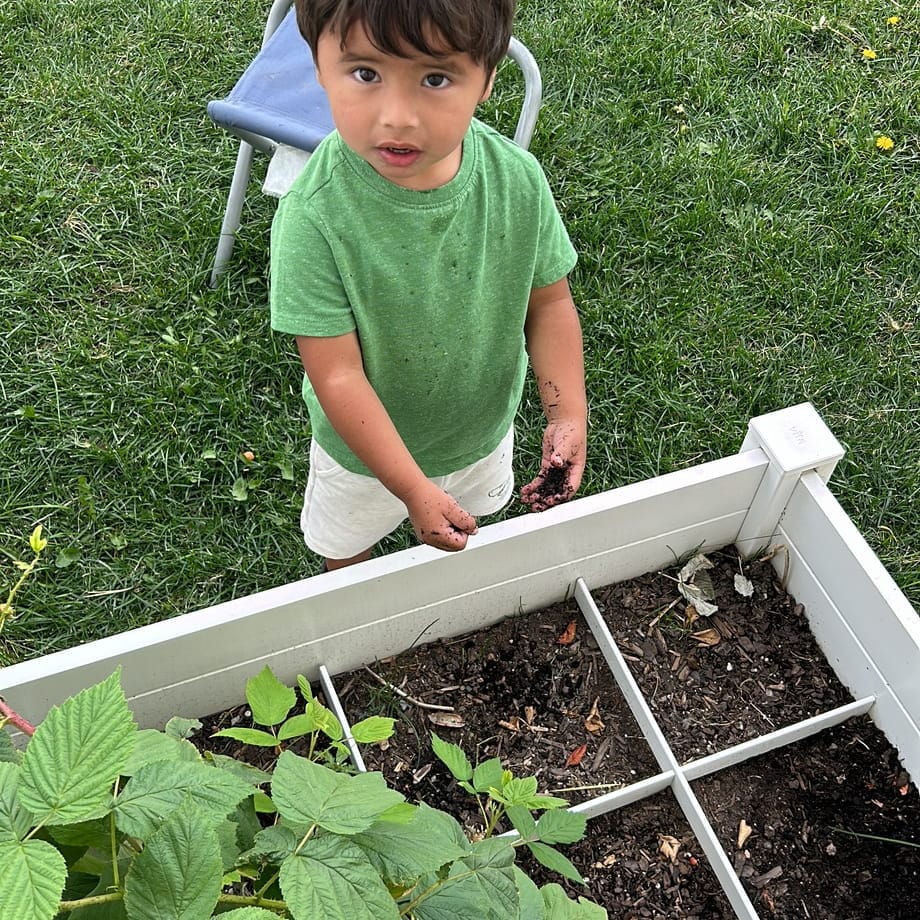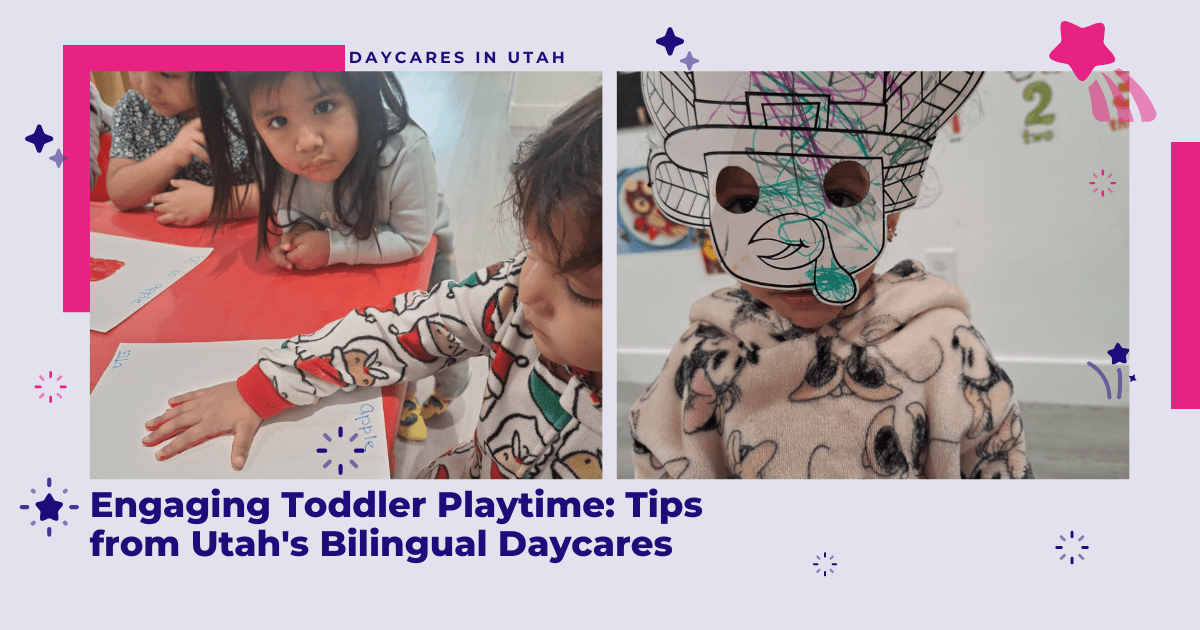Toddlers are naturally curious, constantly absorbing information and making sense of the world around them. Their early experiences shape how they think, solve problems, and interact with others, laying the foundation for lifelong learning.
At Sweet Heart Home (Magna) and Tiny Humans (West Jordan), we use structured play, brain-stimulating games, and problem-solving exercises to nurture toddlers' cognitive development in a fun and engaging way.
This guide will explore:
- How cognitive skills develop in early childhood and what activities support brain growth.
- Why family daycare settings provide an ideal environment for cognitive stimulation.
- How bilingual learning enhances memory, problem-solving, and social skills.
Understanding Early Brain Development in Toddlers
The first few years of life are a critical period for cognitive development. By the time a child turns three, their brain has formed millions of neural connections, shaping their ability to think, learn, and communicate.
Interactive experiences, sensory play, and social interactions help strengthen these neural pathways, making early childhood environments essential for long-term cognitive growth.
At our Utah family daycares, we design activities that:
✔️ Encourage problem-solving and logical thinking through hands-on learning.
✔️ Strengthen memory and attention with structured routines and engaging play.
✔️ Develop language and communication skills with bilingual exposure.
When toddlers engage in purposeful play, they build the mental flexibility and problem-solving skills needed for future academic success.
How Cognitive Skills Develop in Early Childhood
Cognitive development involves a toddler’s ability to:
- Understand cause and effect (e.g., realizing that pushing a button makes a toy light up).
- Recognize patterns (e.g., sorting shapes, matching colors).
- Improve memory recall (e.g., remembering names, songs, or daily routines).
- Develop problem-solving skills (e.g., figuring out how to stack blocks without them falling).
During the 0-3 years phase, toddlers experience rapid brain growth, making it crucial to provide age-appropriate cognitive activities that support their learning style.
At Sweet Heart Home and Tiny Humans, we use:
- Sensory exploration (textures, sounds, colors) to engage young learners.
- Simple cause-and-effect games like rolling a ball or stacking objects.
- Memory-based games and interactive storytelling to build language skills.
- Puzzles, matching games, and sorting activities to develop logic and problem-solving.
By integrating these activities into daily routines, we help toddlers build strong cognitive foundations that prepare them for school and beyond.
Why Family Daycare is Ideal for Brain Development
Unlike larger daycare centers, family-based childcare programs offer a more stimulating environment where children receive one-on-one attention and structured cognitive activities tailored to their development.
Why Family Daycares Promote Stronger Cognitive Growth:
✔️ Smaller group sizes → More opportunities for focused learning and problem-solving activities.
✔️ Stronger caregiver-child relationships → Secure attachment helps toddlers feel confident to explore and learn.
✔️ Flexible learning experiences → A mix of structured lessons and free play encourages independent thinking.
✔️ Real-world experiences → Activities like cooking, gardening, and storytelling introduce toddlers to practical problem-solving.
At Sweet Heart Home (Magna) and Tiny Humans (West Jordan), we ensure that every child gets the cognitive stimulation they need in a nurturing, home-like environment.
How Bilingual Learning Strengthens Cognitive Growth
Research shows that bilingual exposure during early childhood enhances cognitive abilities, improving memory, problem-solving, and adaptability.
At Tiny Humans (West Jordan) and Sweet Heart Home (Magna), we integrate bilingual learning into our curriculum through:
- Daily conversations in both English and Spanish to enhance memory retention.
- Bilingual storytelling and music to improve listening skills and pattern recognition.
- Interactive group activities that encourage toddlers to express themselves in both languages.
Cognitive Benefits of Bilingual Learning:
✔️ Better problem-solving skills – Switching between languages strengthens mental flexibility.
✔️ Stronger memory and focus – Bilingual toddlers tend to have higher attention control.
✔️ Enhanced pattern recognition – Learning two languages improves the brain’s ability to detect and predict patterns.
✔️ Higher adaptability – Exposure to multiple languages teaches toddlers to adjust to new situations quickly.
By incorporating bilingual education into everyday learning, we help toddlers boost cognitive growth while developing strong communication skills.

Brain-Stimulating Games for Toddlers
Brain-stimulating games help toddlers enhance memory, improve problem-solving skills, and build language development while having fun. At Sweet Heart Home (Magna) and Tiny Humans (West Jordan), we incorporate structured and free-play activities that encourage cognitive development through engaging, hands-on experiences.
These games help toddlers:
✔️ Expand their vocabulary and language comprehension.
✔️ Strengthen memory recall and pattern recognition.
✔️ Improve problem-solving and logical thinking.
Language Development Through Play
Toddlers develop language skills best when they are actively engaged in conversation, storytelling, and interactive activities. At our bilingual family daycare, we use fun, immersive language games that support early speech, comprehension, and expression.
Games That Build Language Skills:
- Sing-Along Songs & Rhyming Games → Helps toddlers recognize word patterns, pronunciation, and rhythm.
- Storytelling with Puppets & Picture Books → Encourages listening skills, imagination, and vocabulary expansion.
- Call-and-Response Activities → Teaches toddlers how to listen, respond, and form sentences naturally.
- Bilingual Word Matching → Reinforces language comprehension in English and Spanish.
These activities make learning a language fun and interactive, allowing toddlers to develop communication skills effortlessly.
Memory-Boosting Games for Early Learning
Memory games are an excellent way to strengthen cognitive recall and focus. Engaging in memory-based activities helps toddlers:
- Retain information more effectively.
- Improve concentration and attention span.
- Recognize familiar faces, objects, and sequences.
Memory Games We Use in Daycare:
- "What's Missing?" Game → Place a few familiar objects on a tray, remove one, and ask the child what’s missing.
- Matching Cards & Picture Puzzles → Helps toddlers associate objects, colors, and patterns.
- Memory Songs & Repetitive Stories → Reinforces word retention and sequence recognition.
- Sensory Play with Hidden Objects → Encourages visual and tactile memory development.
By making memory-building activities fun and engaging, toddlers strengthen their recall abilities and pattern recognition.
Pattern Recognition & Logic Activities
Pattern recognition helps toddlers understand sequences, develop critical thinking, and improve problem-solving skills.
Best Pattern & Logic Games for Toddlers:
- Sorting & Grouping Objects → Helps children recognize similarities and differences (e.g., sorting by color, shape, or size).
- Stacking Blocks in Patterns → Encourages spatial awareness and logical sequencing.
- "What Comes Next?" Sequencing Games → Improves predictive thinking and cognitive planning.
- Building Simple Puzzles → Strengthens problem-solving and fine motor skills.
These activities train the brain to identify relationships between objects, develop logic, and improve reasoning abilities.
Problem-Solving Exercises for Cognitive Growth
Problem-solving is a crucial skill for early childhood development, allowing toddlers to think independently, adapt to challenges, and make decisions. At Sweet Heart Home and Tiny Humans, we introduce age-appropriate problem-solving exercises that encourage creative thinking and logical reasoning.
Everyday Learning Moments that Build Problem-Solving Skills
Problem-solving doesn’t just happen during structured activities—it occurs in everyday moments. We create real-world learning experiences that allow toddlers to:
✔️ Make choices and experience cause and effect.
✔️ Learn through trial and error.
✔️ Find creative solutions to small challenges.
Examples of Everyday Problem-Solving Activities:
- Figuring Out How to Open a Container → Helps toddlers understand spatial awareness and hand-eye coordination.
- Learning to Put on Shoes or Zip Up a Jacket → Encourages independence and persistence.
- Stacking and Balancing Blocks → Teaches adjustments, trial and error, and logical thinking.
- Solving Simple Obstacle Challenges → Crawling under, over, or around obstacles builds spatial reasoning.
By incorporating problem-solving into everyday activities, toddlers become more independent, confident, and resilient learners.
Encouraging Critical Thinking Through Play
Critical thinking is the ability to analyze situations, think ahead, and make decisions based on experience. Play-based activities are the best way to strengthen these skills naturally.
Critical Thinking Play-Based Activities:
- Cause-and-Effect Water Play → Experimenting with floating vs. sinking objects.
- Guessing Games (What’s Inside the Box?) → Encourages prediction and logical reasoning.
- Obstacle Courses & Maze Challenges → Strengthens spatial awareness and planning.
- "Which One Doesn’t Belong?" Sorting Game → Enhances problem-solving and classification skills.
Through these games, toddlers build reasoning skills that help them approach new challenges with confidence.
Cognitive Development Activities to Problem-Solving in Group Play
Playing in groups teaches toddlers how to communicate, collaborate, and solve problems together. These experiences improve social intelligence, patience, and teamwork.
Group Play Activities That Build Problem-Solving Skills:
- Building Towers & Bridges Together → Encourages teamwork and shared decision-making.
- Role-Playing Scenarios → Helps toddlers practice negotiation and conflict resolution (e.g., playing pretend grocery store).
- Turn-Taking Games → Strengthens fairness, patience, and cooperation.
- Treasure Hunts with Clues → Encourages toddlers to work together to solve puzzles.
Group play fosters social-emotional learning while reinforcing problem-solving and critical thinking skills.

Learning Through Exploration: Hands-On Cognitive Development
Exploration is one of the most effective ways for toddlers to develop cognitive skills. When children are encouraged to engage in hands-on activities, they strengthen problem-solving abilities, creativity, and critical thinking.
At Sweet Heart Home (Magna) and Tiny Humans (West Jordan), we create an active learning environment where toddlers can explore textures, materials, cause-and-effect relationships, and interactive challenges to build strong cognitive foundations.
Encouraging Guided Discovery & Curiosity
Toddlers are naturally curious, and their brains develop best when they are given the freedom to explore within a structured, safe environment.
We encourage guided discovery learning by:
- Asking open-ended questions to spark thinking (e.g., “What do you think will happen if we mix these colors?”).
- Allowing trial and error so toddlers can experiment and find solutions independently.
- Providing engaging materials like blocks, sand, and water that promote hands-on exploration.
- Creating interactive environments with nature walks, sensory bins, and real-world experiences.
By supporting natural curiosity, toddlers develop higher-level thinking skills that set the stage for lifelong learning.
Hands-On Play for Sensory & Cognitive Growth
Sensory play is crucial for cognitive development, helping toddlers process information, refine motor skills, and make sense of their surroundings.
Best Hands-On Activities for Cognitive Growth:
- Water Play with Measuring Cups → Teaches concepts of volume, cause and effect, and problem-solving.
- Sensory Bins (Rice, Sand, or Textured Fabrics) → Enhances tactile learning and memory formation.
- Building Towers & Bridges → Strengthens logical reasoning and spatial awareness.
- Exploring Natural Objects (Leaves, Stones, Shells) → Encourages toddlers to observe, classify, and describe their environment.
By engaging multiple senses at once, toddlers form deeper connections in the brain, improving memory retention and critical thinking.
The Power of Creative Play in Brain Development
Creative play fosters imagination, emotional expression, and cognitive flexibility—all essential skills for early brain development.
How Creative Play Enhances Cognitive Skills:
- Dramatic Play (Role-Playing Scenarios) → Helps toddlers solve problems, develop empathy, and practice communication.
- Music & Dance Activities → Strengthens pattern recognition, rhythm, and motor coordination.
- Art & Free Drawing → Encourages self-expression and fine motor control.
- Storytelling & Make-Believe Games → Builds language skills and narrative thinking.
At Sweet Heart Home and Tiny Humans, we provide an environment rich in creative play that nurtures brain development through storytelling, music, and imaginative role-playing.
How Our Family Daycares Support Cognitive Development
At Sweet Heart Home (Magna) and Tiny Humans (West Jordan), we take a research-backed approach to cognitive development by combining:
✔️ Play-based learning to enhance problem-solving and logical thinking.
✔️ Bilingual education to improve memory and language skills.
✔️ Hands-on discovery activities to encourage curiosity and creativity.
✔️ Structured daily routines to build strong learning habits.
Sweet Heart Home’s Play-Based Learning Approach (Magna)
At Sweet Heart Home, we emphasize play-based education, ensuring that toddlers develop cognitive skills through meaningful, hands-on activities.
How We Integrate Play-Based Learning:
- Interactive problem-solving games to promote critical thinking.
- Outdoor exploration and nature-based play to enhance sensory learning.
- Music, storytelling, and bilingual activities to strengthen language processing and memory recall.
- Age-appropriate puzzles and building materials to develop spatial awareness and logical reasoning.
By making learning fun and engaging, we ensure that toddlers at Sweet Heart Home gain the cognitive skills they need to succeed.
Tiny Humans’ Bilingual & Exploration-Based Activities (West Jordan)
At Tiny Humans in West Jordan, we integrate bilingual learning with hands-on discovery activities to foster stronger cognitive connections and early problem-solving abilities.
Key Aspects of Our Exploration-Based Approach:
- Bilingual immersion through daily conversations and storytelling to improve language comprehension and adaptability.
- Guided exploration in science and nature to promote curiosity and observation skills.
- Sensory play stations with textures, sounds, and interactive elements to develop cognitive flexibility.
- Role-playing scenarios and cooperative group activities to enhance problem-solving and communication.
This unique bilingual and exploration-based model ensures that children at Tiny Humans develop strong thinking skills while gaining language proficiency.
Structured Learning Routines for Brain Growth
A well-structured daily routine helps toddlers:
✔️ Feel secure and confident in their learning environment.
✔️ Improve memory through predictable activities.
✔️ Strengthen executive functioning skills like planning and focus.

Supporting Your Child’s Cognitive Growth at Home
Cognitive development doesn’t stop when a child leaves daycare—it continues at home through daily interactions, play, and exploration. Parents play a crucial role in reinforcing problem-solving skills, memory-building activities, and creative learning experiences that help toddlers grow into confident, independent thinkers.
At Sweet Heart Home (Magna) and Tiny Humans (West Jordan), we encourage families to actively participate in their child’s cognitive development by integrating fun and engaging learning opportunities into everyday life.
How to Track Cognitive Development Milestones
Understanding your child’s cognitive milestones helps you track their progress and ensure they are developing key skills at an appropriate pace.
Cognitive Milestones for Toddlers (Ages 1-3):
✅ Problem-Solving Skills – Can stack blocks, sort objects by color or shape, and solve simple puzzles.
✅ Memory & Recognition – Can recall familiar faces, follow simple instructions, and recognize objects in books.
✅ Language Development – Begins forming sentences, names objects, and engages in pretend play.
✅ Pattern Recognition – Can identify sequences (e.g., what comes next in a routine) and match similar objects.
✅ Attention Span – Shows interest in interactive activities and listens to short stories.
How to Encourage Progress:
- Play Matching & Sorting Games – Reinforces pattern recognition and logical thinking.
- Encourage Storytelling & Conversations – Helps toddlers expand their vocabulary and improve memory recall.
- Introduce Simple Challenges – Let them figure out how to open a container or complete a stacking activity.
- Use Repetition & Routines – Consistent daily routines help toddlers strengthen memory and processing skills.
If you notice delays in problem-solving, memory recall, or attention span, working closely with your daycare provider can help identify additional strategies for cognitive support.
The Role of Family Engagement in Brain Growth
Toddlers learn best through real-life experiences, and family engagement plays a vital role in their cognitive and social-emotional development.
How Parents Can Support Brain Growth at Home:
🧠 Encourage Open-Ended Play: Provide blocks, dolls, kitchen sets, and art supplies that allow your child to use their imagination and problem-solving skills.
🧠 Ask Thought-Provoking Questions: Instead of giving answers, ask “What do you think will happen if…?” to spark critical thinking.
🧠 Read Together Daily: Storytime enhances language development, memory, and comprehension.
🧠 Let Your Child Help with Simple Tasks: Sorting laundry, measuring ingredients in the kitchen, or picking out clothes helps develop categorization and reasoning skills.
🧠 Create Sensory Experiences: Sand, water, textured fabrics, and musical toys stimulate brain connections and support fine motor development.
When families actively engage in their child’s learning process, toddlers develop stronger memory skills, better problem-solving abilities, and greater independence.
Choosing a Family Daycare that Fosters Cognitive Skills
Selecting the right daycare is essential for ensuring that your child is stimulated, challenged, and supported in their cognitive growth. A high-quality family daycare program should:
✔️ Prioritize play-based and hands-on learning → Activities that build memory, logic, and creativity.
✔️ Provide bilingual learning opportunities → Helps improve language skills and problem-solving abilities.
✔️ Incorporate structured and free play → Ensures a balance of guided discovery and independent thinking.
✔️ Offer small class sizes → Allows for individualized attention and personal learning experiences.
✔️ Encourage parent involvement → Provides opportunities for family engagement in a child’s development.
At Sweet Heart Home and Tiny Humans, we are committed to providing a cognitive-rich learning environment where toddlers can explore, experiment, and grow their thinking skills every day.
Would you like to schedule a visit and see how our play-based cognitive development activities help toddlers thrive? Contact us today to learn more about our approach to early learning!






